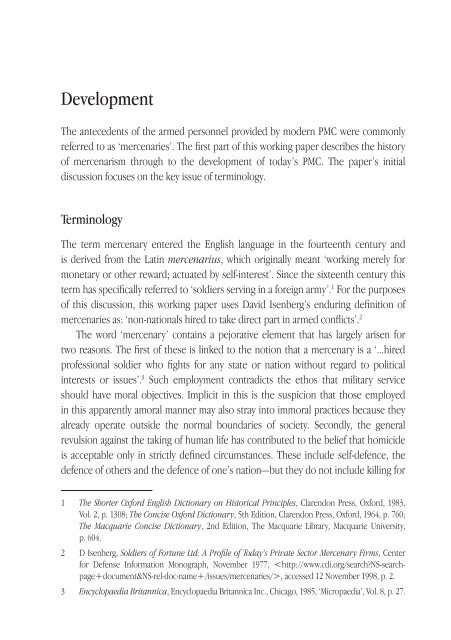View the pdf - Australian Army
View the pdf - Australian Army
View the pdf - Australian Army
Create successful ePaper yourself
Turn your PDF publications into a flip-book with our unique Google optimized e-Paper software.
DevelopmentThe antecedents of <strong>the</strong> armed personnel provided by modern PMC were commonlyreferred to as ‘mercenaries’. The first part of this working paper describes <strong>the</strong> historyof mercenarism through to <strong>the</strong> development of today’s PMC. The paper’s initialdiscussion focuses on <strong>the</strong> key issue of terminology.TerminologyThe term mercenary entered <strong>the</strong> English language in <strong>the</strong> fourteenth century andis derived from <strong>the</strong> Latin mercenarius, which originally meant ‘working merely formonetary or o<strong>the</strong>r reward; actuated by self-interest’. Since <strong>the</strong> sixteenth century thisterm has specifically referred to ‘soldiers serving in a foreign army’. 1 For <strong>the</strong> purposesof this discussion, this working paper uses David Isenberg’s enduring definition ofmercenaries as: ‘non-nationals hired to take direct part in armed conflicts’. 2The word ‘mercenary’ contains a pejorative element that has largely arisen fortwo reasons. The first of <strong>the</strong>se is linked to <strong>the</strong> notion that a mercenary is a ‘...hiredprofessional soldier who fights for any state or nation without regard to politicalinterests or issues’. 3 Such employment contradicts <strong>the</strong> ethos that military serviceshould have moral objectives. Implicit in this is <strong>the</strong> suspicion that those employedin this apparently amoral manner may also stray into immoral practices because <strong>the</strong>yalready operate outside <strong>the</strong> normal boundaries of society. Secondly, <strong>the</strong> generalrevulsion against <strong>the</strong> taking of human life has contributed to <strong>the</strong> belief that homicideis acceptable only in strictly defined circumstances. These include self-defence, <strong>the</strong>defence of o<strong>the</strong>rs and <strong>the</strong> defence of one’s nation—but <strong>the</strong>y do not include killing for1 The Shorter Oxford English Dictionary on Historical Principles, Clarendon Press, Oxford, 1983,Vol. 2, p. 1308; The Concise Oxford Dictionary, 5th Edition, Clarendon Press, Oxford, 1964, p. 760;The Macquarie Concise Dictionary, 2nd Edition, The Macquarie Library, Macquarie University,p. 604.2 D Isenberg, Soldiers of Fortune Ltd: A Profile of Today’s Private Sector Mercenary Firms, Centerfor Defense Information Monograph, November 1977, ,accessed 12 November 1998, p. 2.3 Encyclopaedia Britannica, Encyclopaedia Britannica Inc., Chicago, 1985, ‘Micropaedia’, Vol. 8, p. 27.
















